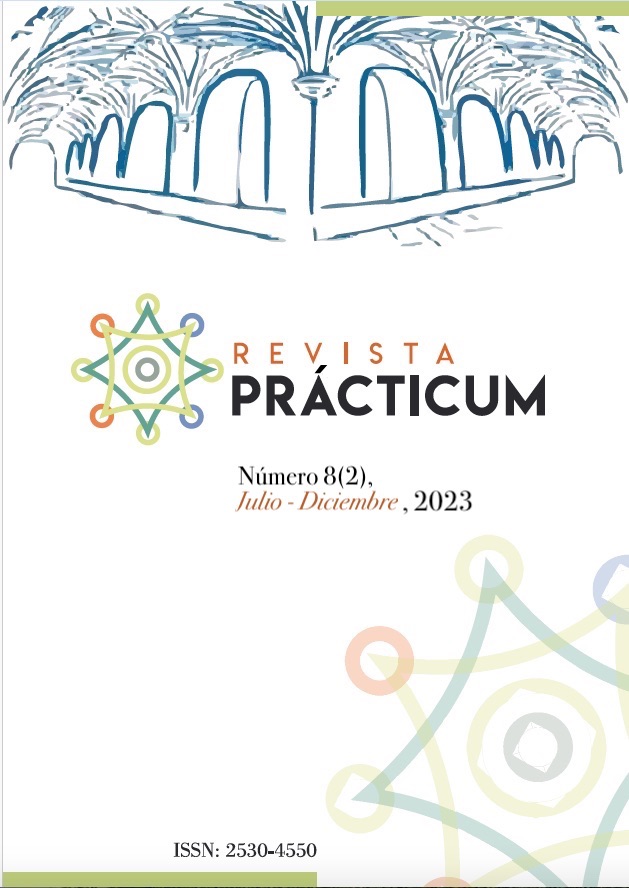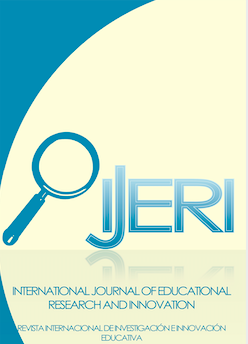Prior knowledge. Influence on the Educational Sciences Practicum.
DOI:
https://doi.org/10.24310/rep.8.2.2023.17069Keywords:
Practicum, Prior knowledge, Academic performance, Higher education, Education SciencesAbstract
The objective of this study is to explore the relationship between the previous knowledge of the students in the performance during their curricular practices of university degrees included in the educational area. The sample is made up of 127 university students, of whom 74% are studying undergraduate degrees (16.4% Degree in Early Childhood Education; 46.6% Degree in Primary Education; 11% Degree in Social Education), compared to 26% who are enrolled in an Official Master's Degree (12% Master's Degree in Teacher Training; 14% Master's Degree in Psychopedagogy). It was developed in two phases: 1) descriptive, correlational and reliability analysis of the instruments for this study and 2) comparison of differences between groups. The results indicate that all the studied constructs are positively and significantly related to each other. In addition, students enrolled in a master's degree show better results in prior knowledge and academic performance. The implications of these findings for educational research and practice are discussed.
Downloads
Metrics
References
Aneas, A., Rubio, M.J. & Vilà, R., (2018). Portafolios digital y evaluación de las competencias transversales en las prácticas externas del grado de Pedagogía de la Universidad de Barcelona. Educar, 54(2), 283 – 301. https://doi.org/10.5565/rev/educar.878
Aleta, B. T. (2016). Engineering Self-Efficacy Contributing to the Academic Performance of AMAIUB Engineering Students: A Qualitative Investigation. Journal of Education and Practice, 7(27), 53-61.
Alsina, A. & Batllori, R. (2015). Hacia una formación del profesorado basada en la integración entre la práctica y la teoría: una experiencia en el Practicum desde el modelo realista. Investigación en la escuela, 85, 5-18.
Alvarez-Pérez, P.R. & López-Aguiar, D. (2020). Preferencias vocacionales, transición y adaptación a la enseñanza universitaria un análisis desde la perspectiva del alumnado de bachillerato. Bordón: Revista de Pedagogía, 72(4), 9-26. https://doi.org/10.13042/Bordon.2020.80131
Bretones, A. (2013). El Prácticum de Magisterio en Educación Primaria: una mirada retrospectiva. Revista Complutense de Educación, 24(2), 443-471. http://doi:10.5209/revRCED.2013.v24.n2.42088
Chan-Pavón, M. V., Mena-Romero, D. A., Escalante-Euán, J. F., & Rodríguez-Martín, M. D. (2018). Contribución de las Prácticas Profesionales en la formación de los Estudiantes de la Facultad de Ingeniería Química de la Universidad Autónoma de Yucatán (México). Formación universitaria, 11(1), 53-62. https://dx.doi.org/10.4067/S0718-50062018000100053
Cohen, J. (1988). Statistical power analysis for the behavioral sciences (2nd ed.). Lawrence Erlbaum Associates.
Cohen, J. (1992). A power primer. Psychological Bulletin, 112(1), 155 https://doi.org/10.1037/0033-2909.112.1.155
Cohen, L., Manion, L., & Morrison, K. (2018). Research Methods in Education (8nd ed.). Routledge.
De Clercq, M., Galand, B., Hospel, V., & Frenay, M. (2021). Bridging Contextual and Individual Factors of Academic Achievement: A Multi-Level Analysis of Diversity in the Transition to Higher Education. Frontline Learning Research, 9(2), 96-120. https://doi.org/10.14786/flr.v9i2.671
Dolmans, D. H. J. M., & Others, A. (1996). Effects of tutor expertise on student performance in relation to prior knowledge and level of curricular structure. Academic Medicine, 71, (9), 1008-11.
Esteve, O., Melief, K. & Alsina, A. (2010). Creando mi profesión. Una propuesta para el desarrollo profesional del profesorado. Octaedro.
Etxeberría, P., Alberdi, E., Eguia, I. & García, Mª. J. (2017). Análisis del Rendimiento Académico en Relación al Perfil de Ingreso del Alumnado e Identificación de Carencias Formativas en Materias Básicas de dos Grados de Ingeniería. Formación Universitaria, 10(4), 67-74. doi: 10.4067/S0718-50062017000400007
Fernández, S.G. (2018). Rendimiento Académico en Educación Superior: Desafíos para el Docente y Compromiso del Estudiante. Revista Científica de la UCSA, 5 (3), 55-63.
Fernández-Mellizo, M. & Constante-Amores, A. (2020). Determinantes del rendimiento académico de los estudiantes de nuevo acceso a la Universidad Complutense de Madrid. Revista de Educación, 387, 11 – 38. DOI: 10.4438/1988-592X-RE-2020-387-433
Ficco, C. & Musa, P. (2021). Conocimientos financieros previos y su relación con el rendimiento académico de estudiantes universitarios en matemática financiera. Revista de la Facultad de Ciencias Económicas, 26(1), 147 - 171. http://dx.doi.org/10.30972/rfce.2615039
García-Vargas, S. M.; Martín-Cuadrado, A. M. & González-Fernández, R. (2018). Procedimientos Innovadores Utilizados En Las prácticas Externas Para El Desarrollo De La Identidad Profesional. Revista Prácticum, 3(2), 41 - 59.
Gairín-Sallán, J., Díaz-Vicario, A.; del Arco-Bravo, I. & Flores Alarcia, Ó. (2019). Efecto e impacto de las prácticas curriculares de los grados de educación infantil y primaria: la perspectiva de estudiantes, tutores y coordinadores. Educación XX1, 22(2), 17-43, doi: 10.5944/educXX1.2131
González-Garzón, M. L., & Laorden-Gutiérrez, C. (2012). El Prácticum en la formación inicial de los Maestros en las nuevas titulaciones de Educación Infantil y Primaria. El punto de vista de profesores y estudiantes. Pulso. Revista de educación, 35, 131–154. https://doi.org/10.58265/pulso.5050
González-Sanmamed, M. & Fuentes-Abeledo, E.J. (2011) El Prácticum en el aprendizaje de la profesión docente. Revista de Educación, 354, 47-70.
Greene, J. A., Costa, L., Robertson, J., Pan, Y., & Deekens, V. M. (2010). Exploring Relations among College Students' Prior Knowledge, Implicit Theories of Intelligence, and Self-Regulated Learning in a Hypermedia Environment. Computers & Education, 55(3), 1027-1043. https://doi.org/10.1016/j.compedu.2010.04.013
Hailikari, T., Nevgi, A., & Komulainen, E. (2008). Academic Self-Beliefs and Prior Knowledge as Predictors of Student Achievement in Mathematics: A Structural Model. Educational Psychology, 28(1), 59-71.
IBM Corp. Released (2018). IBM SPSS Statistics for Windows, Version 22,0. IBM Corp
Ionas, I. G., Cernusca, D., & Collier, H. L. (2012). Prior Knowledge Influence on Self-Explanation Effectiveness when Solving Problems: An Exploratory Study in Science Learning. International Journal of Teaching and Learning in Higher Education, 24(3), 349-358.
The jamovi project (2023). jamovi (Version 2.3) [Computer Software]. Retrieved from https://www.jamovi.org
Lazarová, B., & Pol, M. (2019). Prácticum de los futuros docentes: Checos en busca de formas para avanzar. Revista Prácticum, 4(1), 4-18. https://doi.org/10.24310/RevPracticumrep.v4i1.9872
Latorre, M.J. & Blanco, F.J. (2011). El Prácticum como espacio de aprendizaje profesional para docentes en formación. REDU: Revista de Docencia Universitaria, 9(2), 35 -54.
Li, J., Han, X., Wang, W., Sun, G., & Cheng, Z. (2018). How social support influences university students' academic achievement and emotional exhaustion: The mediating role of self-esteem. Learning and Individual Differences, 61, 120-126. DOI: 10.1016/j.lindif.2017.11.016.
Madueño, M. L., & Márquez, L. (2020). Formación de la identidad docente de estudiantes de la carrera de Educación Primaria desde la experiencia de la práctica profesional. Formación universitaria, 13(5), 57-68. https://dx.doi.org/10.4067/S0718-50062020000500057
Martín-González, S. & García-Gómez, T. (2022). Fortalezas y debilidades del Prácticum según el alumnado del Grado en Educación Primaria. Revista Prácticum, 7 (1), 106-121. https://doi.org/10.24310/RevPracti cumrep.v7i1.13501
Muñoz, F.O. & Arvayo, K.L. (2015). Identidad professional docente: ¿Qué significa ser professor? Revista Científica Europea, 11, 97-110.
Navarro-Soria, I., González-Gómez, C., López-Monsalve, B., & Botella-Pérez, P. (2015). Aprendizaje de contenidos académicos y desarrollo de competencias profesionales a través de prácticas pedagógicas multidisciplinares y trabajo cooperativo. Revista de Investigación Educativa, 33(1), 99–117. https://doi.org/10.6018/rie.33.1.183971
Rodicio-García, M.I. & Iglesias-Cortizas, M.J. (2011). La formación en competencias a través del Prácticum: un estudio piloto. Revista de educación, 354, 99 – 124.
Rodríguez-Fernández, A. Droguett, L. & Revuelta, L. (2012). School and Personal Adjustment in Adolescence: The Role of Academic Self-Concept and Perceived Social Support. Revista de Psicodidáctica, 17(2), 397 – 415.
Rodríguez-Gómez, D., Armengol, C., Meneses, J. (2017). La adquisición de las compentencias profesionales a través de las prácticas curriculares de la formación inicial de maestros. Revista de Educación, 376, 229-251. DOI: 10.4438/1988-592X-RE-2017-376-350
Rosário, P., Núñez, J.C., Valle, A., Paiva, O., & Polydoro, S. (2013). Enfoques de enseñanza en Bachillerato en función de variables contextuales y del docente. Revista de Psicodidáctica, 18(1), 25-45.
Sarceda-Gorgoso, M.C. & Rodicio-García, M.L. (2018). Escenarios formativos y competencias profesionales en la formación inicial del profesorado. Revista Complutense de Educación, 29 (1), 147-164. https://doi.org/10.5209/RCED.52160
Sarceda-Gorgoso, M.C., Barreira-Cerqueiras, E.M. & Caldeiro-Pedreira, M.C. (2020). El Prácticum en la formación del profesorado técnico de FP. Revista Practicum, 5(1), 37-53 DOI: 10.24310/RevPracticumrep.v5i1.9829
Seery, M. K. (2009). The role of prior knowledge and student aptitude in undergraduate performance in chemistry: A correlation-prediction study. Chemistry Education Research and Practice, 10(3), 227-232. doi:https://doi.org/10.1039/b914502h
Suárez-Álvarez, J., Fernández-Alonso, R., & Muñiz, J. (2014). Autoconcepto, motivación, expectativas y nivel socioeconómico como predictores del rendimiento académico en matemáticas. Aprendizaje y diferencias individuales, 30, 118–123. https://doi.org/10.1016/j.lindif.2013.10.019
Tayfur, C., & Ulupinar, S. (2016). The Effect of Perceived Social Support on the Academic Achievement of Health College Students. Journal of Psychiatric Nursing/Psikiyatri Hemsireleri Dernegi, 7(1), 1-6.
Tejada, J., & Ruiz, C. (2016). Evaluación de competencias profesionales en educación superior: retos e implicaciones. Educación XX1, 19(1), 17-38. doi:http://10.5944/educXX1.12175
Tejada, J., Carvalho-Dias, M.L. & Ruiz-Bueno, C. (2017). El prácticum en la formación de maestros: percepciones de los protagonistas. Magis, Revista Internacional de Investigación en Educación, 9(19), 91- 114. doi: 10.11144/Javeriana.m9-19.
Tejada, J. (2020). El prácticum en educación superior. Algunos hitos, problemáticas y retos de las tres últimas décadas. REDU: Revista de Docencia Universitaria, 18(1), 105-121.
Yang, J. C., & Quadir, B. (2018). Effects of Prior Knowledge on Learning Performance and Anxiety in an English Learning Online Role-Playing Game. Educational Technology & Society, 21(3), 174-185.

Downloads
Published
How to Cite
Issue
Section
License
Copyright (c) 2023 Clara Isabel Fernández-Rodicio, Abellán-Roselló, L. (Autor/a)

This work is licensed under a Creative Commons Attribution-NonCommercial-ShareAlike 4.0 International License.
Acceptance of the work implies that the author grants Revista Prácticum the exclusive rights to reproduce, distribute and sell his or her work worldwide, both in digital and paper formats, CD-ROM, etc.
Likewise, the authors shall grant Revista Prácticum the rights of dissemination, public communication on the Internet and IT networks, data buses, as well as any other portals or electronic devices for online consultation of its contents and extracts, under the conditions of the portal, repositories or databases where the work is stored.
Revista Prácticum allows authors to publish and disseminate their articles and works on their personal websites, research teams, institutional repositories and scientific databases. All this in accordance with the Creative Commons 4.0 License








8.png)








